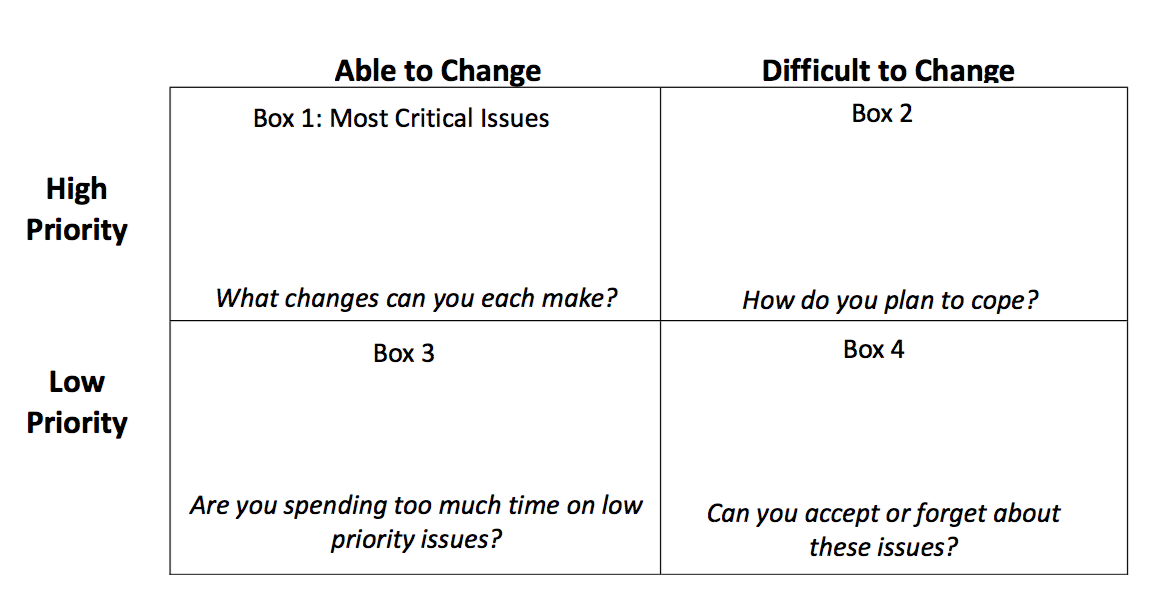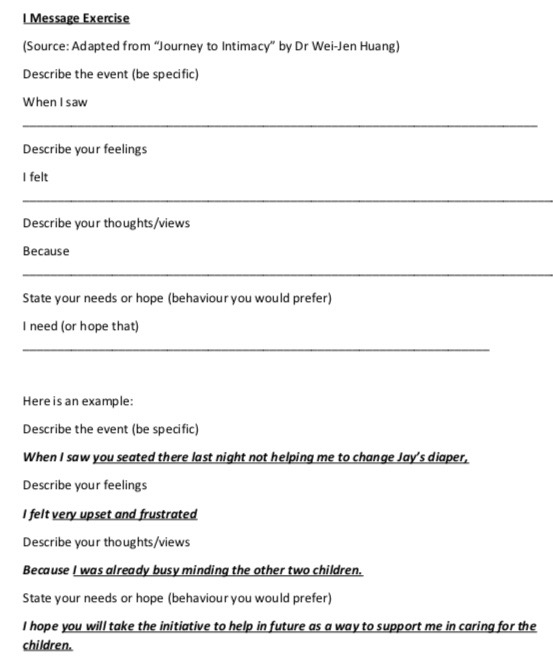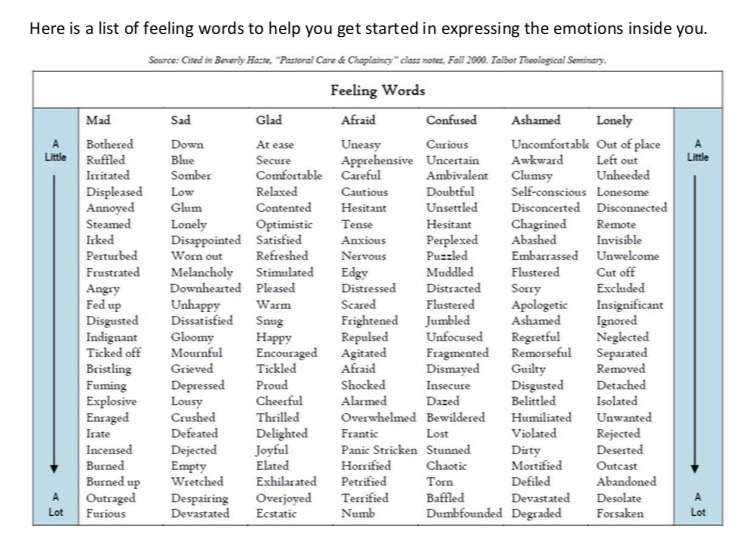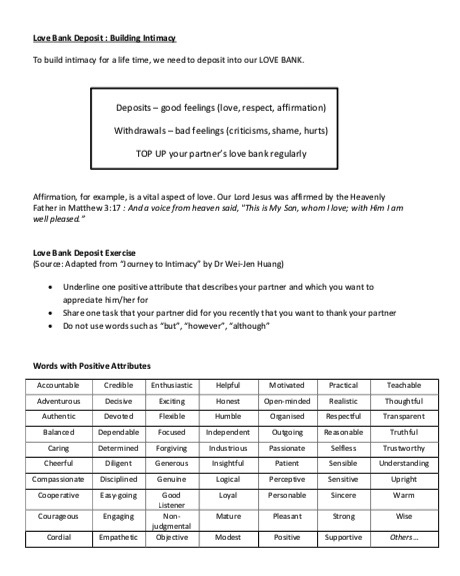
Be willing to open up and talk. Engage in active listening. Practise empathy. These will help to safeguard your marriage under strained conditions. Photo by Afif Kusuma on Unsplash.
“How To Survive The Circuit Breaker Without Killing Each Other.”
The title of the brochure being distributed to couples and families by Bethesda Bedok-Tampines Church’s Marriage Ministry cuts straight to the chase.
After one week of entire households cloistered together under Circuit Breaker conditions, many are asking: Can our family survive ’til May 4?
“Many couples now experience dramatic changes to their routines,” said the BBTC Marriage Team. “They are confined to working from home in shared spaces. They are torn between looking after young children and caring for elderly parents. Some face possible unemployment and suffer from financial insecurity.
“All these are recipes for conflict between husband and wife. It is no wonder that the media is reporting an increase in divorces. Applications for divorce in Xi’an, China, spiked as a result of home quarantine. British lawyers are predicting a similar trend in the UK post lockdown.”
In Singapore, The Straits Times reported on April 9 that the Association of Women for Action and Research (Aware) received 619 inquiries about family violence last month, a 35% rise from March last year.
One social worker also said that 60% of her daily referrals were related to family violence, compared with 30% last year.
With this in mind, the BBTC Marriage Team wanted to share tips and words of faith, hope and love to encourage married couples, in particular, to “keep your relationships alive and be overcomers during this trying season”.
They hope that the practical handles would serve as reminders to “guard that which is important and precious in the sight of our God”.
Here are their guidelines:
Marriage survival tips
For husbands and wives
1. Communicate care
Make a commitment to care about your spouse’s feelings and sense of helplessness. Listen to each other’s worries, fears, hopes and emotions. Recognise and talk about the stress you are experiencing. Agree on ways to manage this stress. Do the Personal Stress Profile Exercise in the Appendix (below).
2. Commit to “Couple Time”
You may be hard pressed for time to get together meaningfully with each other in the busyness of each day. Now is the golden opportunity to install that Couple Time to renew and refresh your relationship. Set aside protected time for this.
Be willing to open up and talk. Engage in active listening. Practise empathy. There are proven exercises to help you do this. For example, the I-Message and Love Bank Deposit Exercises in the Appendix (below) are helpful tools.
3. Carve out alone time
Experts agree that being together in close quarters 24/7 puts strain on a marriage. It is okay to take a break from each other. Express your expectations and agree on a formula.
For instance, you may want an hour to yourself to chill out and read a book, or you would like to watch a particular TV show uninterrupted. Honour one another’s request for this break. If there are children, take turns to mind them.
4. Care for self
You must also refuel or recharge so that you can last the distance. You will then have something to give to your spouse and family.
Care for your body, soul and spirit. Do not neglect physical exercise and sleep.
Top up your bank with positive emotions. Above all, spend time with the Lord in quiet devotion and feed on His Word. Let the joy of the Lord be your strength. (Nehemiah 8:10)
5. Create a safe environment at home
Counsellors have advised that when people feel safe, they are encouraged to open up and connect. You can create that environment for yourselves and your children.
Practise kindness and respect towards each other. Gather as a family and share your appreciation for one another. Count your blessings and demonstrate gratitude. Mimic our Saviour’s calmness and composure as you go through the day. Create a sanctuary in the midst of the storm.
6. Construct routines
This is an oft-repeated but sound advice. We are wired to desire structure and the familiar. Routines can help ground us and enable us to go through this difficult period. Plan for meal times, work time, study time, chill-out time, and stick to them as much as possible.
7. Carry out Short-Term Plans
Writing on Forbes online, marriage therapist Erika Boissiere advised that getting a handle on the day-to-day stuff in the midst of COVID-19 can help quell anxieties and foster teamwork in the family. Take one day at a time and find ways to take care of the essentials.
How to tackle the supermarket runs? How to decide what to cook or what to order for takeaways? How to get to the GP if someone is unwell? How to help your child with home-based learning? How to manage the demands of WFH (Work From Home)? How to divide household chores and assign tasks?
After all, our Lord Jesus did command us to not worry about tomorrow, for tomorrow will worry about itself. (Matthew 6:34).
8. Capitalise on Teaching Moments
Now is a great time to learn and grow together. As the Holy Spirit teaches you life lessons, share them with your spouse. Affirm and encourage each other.
Within the confines of your home, your lives are on display. Model for your children love, honour, patience, joy and faith, bringing them up in the training and instruction of the Lord. (Ephesians 6:4)
For the WFH folks
Psychology Today provides some tips for those of you who are working from home during this Circuit Breaker.
- Follow your usual routine as much as possible. For example, waking up at the same time, getting “dressed” for work, having that first cuppa in the morning, etc.
- Guard against overworking. Employees do not want their bosses or co-workers to think that they are slacking off. Hence, they work too long hours. Do not let this guilt get to you. Your usual transit time from office to home gives you the buffer between work and home. Learn to create such time boundaries now to separate the two.
- Breaks are essential for your mental wellbeing. As you take breaks in your office, be sure to schedule such time-off for yourself while working from home. Avoid prolonged sitting. Remember to move and stretch. Health experts have provided evidence that long hours of sitting is bad for you.
- Re-arrange things around the house, if possible, to create a conducive space for you to work.
For those with children in the house
Focus on the Family has a very practical tip sheet for juggling childcare and working from home.
- Routines are critical for children as they are for adults. Without routines, children may perceive this as time-off and will not be motivated to learn. If your children are too young to keep engaged, you may need to plan your workday according their routines. For example, starting work earlier before they wake, using their nap time to work on that complex project, etc.
- Set up designated spaces in the house for your work and your children’s learning. Ensure that they understand the space is for online classes and homework; it is not for playing.
- Establish rules. Explain to your children that when you are in your workspace, you cannot be interrupted, unless it is an emergency.
- Be intentional in affirming your children when they have shown effort to stick to schedules and follow rules. Reward them appropriately and reinforce their positive behaviour.
While these are simple, practical handles, we pray that they will serve as reminders for us to guard that which is important and precious in the sight of our God. Be blessed!
Appendix
Personal Stress Profile Exercise – for managing roles and expectations (Source: Prepare-Enrich “Building Strong Marriages”. www.prepare-enrich.com)
- Each of you to select four issues that are the most stressful for you while WFH.
- Review each issue and put it into one of the four cells below.
- Select one issue from Box 1 and work together as a couple to achieve your goals. Communicate about the issue. Use good conflict resolution skills, and exercise flexibility with each other.




The BBTC Marriage Ministry seeks to help young and matured marriages grow and stay strong, and be what God intends for them to be. The Ministry looks to provide for the holistic needs of couples throughout their marriage via three prongs: The Pre-Marital Course, Marriage Mentoring Programme and Marriage Enrichment Seminars.
We are an independent, non-profit organisation that relies on the generosity of our readers, such as yourself, to continue serving the kingdom. Every dollar donated goes directly back into our editorial coverage.
Would you consider partnering with us in our kingdom work by supporting us financially, either as a one-off donation, or a recurring pledge?
Support Salt&Light


